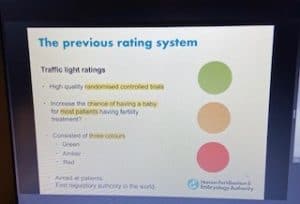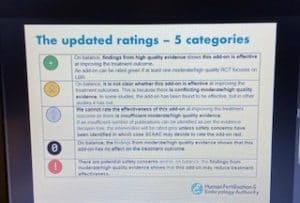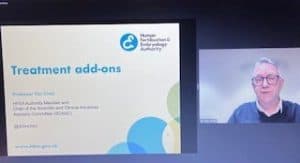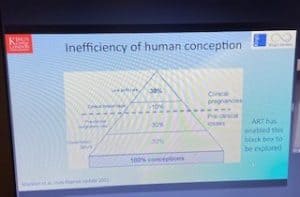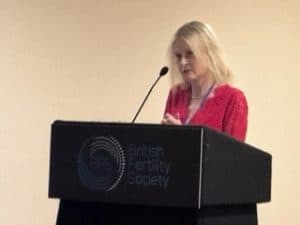8 February 2024
On 7 February 2024 Louisa Ghevaert was delighted to attend Progress Educational Trust’s informative event on the HFEA’s new IVF ‘Add-Ons’ ratings system. It looked at the development, understanding, evidence and use of IVF ‘Add-Ons’. It also celebrated 25 years of publishing BioNews, an online newsletter publishing news on the science, law and ethics of human genetics, assisted conception, and related topics.
Images: Sarah Norcross, Director Progress Educational Trust
PET’s event looked at the development, understanding, evidence and use of IVF ‘Add-Ons’. In introducing the event’s panel of speakers, Sarah Norcross explained that IVF ‘Add-Ons’ add considerable expense to patients’ fertility treatment and that they are not always accompanied by proven evidence. As a result, the HFEA has tried to tackle the issue by providing patients with information about what they entail and whether they are backed by evidence about their efficacy. This lead in 2019 to the HFEA launching its first ratings system consisting of three categories (red, amber and green) for IVF ‘Add-Ons’. This was then updated in October 2023 to expand the ratings system to five categories (adding new categories coloured grey and black).
Dr Tim Child, member of the HFEA and chair of HFEA’s Scientific and Clinical Advances Advisory Committee and Associate Professor of Reproductive Medicine at the University of Oxford’s Nuffield Department of Women’s and Reproductive Health, opened the speaker sessions. He started by saying that ‘Add-Ons’ are optional non-essential treatment used in IVF or ICSI. They usually involve extra cost and evidence for their increased success is often absent or limited. He went on to explain that the HFEA currently has limited powers over the use of ‘Add-Ons’, although it does have powers over the information UK fertility clinics must provide to patients so they can make informed choices. He further explained that the 2019 HFEA ratings system was only based on high quality randomised trials with a focus on whether ‘Add-ons’ increased the chance of having a baby for most patients having fertility treatment.
Dr Tim Child explained that the HFEA’s decision to expand and improve its rating system to five categories enabled it to increase the types of evidence it took into account and not just rely on large randomised control trials (RCTs). It also expanded the types of outcomes to which ‘Add-Ons’ might be considered, to include ovarian hyperstimulation syndrome (OHSS), miscarriage and time taken to achieve live birth. Added to this, it introduced patient subgroups, including age and patients with recurrent implantation failure. In doing so, the HFEA spent over two years consulting and expanding the ratings system in conjunction with patients, licensed clinics, staff working in the fertility sector, patient organisation stakeholders, public and the HFEA’s Scientific and Clinical Advances Advisory Committee (SCAAC).
Overall, Dr Tim Childs said that the new HFEA ratings system marked a significant step up. That said, continuing work is needed to promote the HFEA’s IVF ‘Add-Ons’ information. It also continues to monitor new sources of evidence to ensure that the HFEA responds to UK fertility patients’ needs. The next speaker was Joyce Harper, Professor of Reproductive Science, and Leader of the Reproductive Science and Society Group at University College London’s EGA Institute for Women’s Health. She explained that IVF ‘Add-Ons’ are a controversial topic that still raised lots of questions. She went on to raise questions about whether the list of ‘Add-Ons’ should be increased beyond the 13 currently rated by the HFEA system. This reflected her work with ESHRE where 42 ‘Add-Ons’ were assessed based on high quality evidence, 4 were assessed based on moderate quality evidence, with 95 percent of recommendations based on low quality evidence.
Images: Dr Tim Child, member of the HFEA and chair of HFEA’s Scientific and Clinical Advances Advisory Committee and Associate Professor of Reproductive Medicine at the University of Oxford’s Nuffield Department of Women’s and Reproductive Health. Joyce Harper, Professor of Reproductive Science, and Leader of the Reproductive Science and Society Group at University College London’s EGA Institute for Women’s Health.
Dr Ippokratis Sarris, Director of King’s Fertility and Consultant in Reproductive Medicine and Honorary Clinical Lecturer at King’s College London, delivered an insightful session which started from the premise that we have inefficiency of human conception. He went on to say that many ‘Add-Ons’ are used or suggested after failed treatment attempts and recurrent implantation failure, which are difficult and distressing clinical problems. He added that these are patient groups with predictable low chances of success through assisted conception. He further explained that ‘Add-Ons’ are backed by very little evidence or consistency of data and sparse direct and high quality data. Moreover, in real life patients do not always fit neatly into large randomised trial results. On balance, he rated the HFEA’s new IVF ‘Add-Ons’ rating system with reference to its grey rating having rated the old system as red. He took the view that it was a good advancement, but there was still a long way to go.
Image: Dr Ippokratis Sarris, Director of King’s Fertility and Consultant in Reproductive Medicine and Honorary Clinical Lecturer at King’s College London.
Fertility counsellor, Tracey Sainsbury, then delivered an informative session about fertility patients’ perspectives on IVF ‘Add-Ons’. She started by explaining that the HFEA ratings system is a critical guide and signpost for fertility patients. It was frustrating for patients that there are no green ratings and this led to questions like “what’s the point of it?”. It also led to concerns about why if no ‘Add-Ons’ were rated green they were available and it caused anxiety for patients. Furthermore, it created concerns about paying for ‘Add-Ons’, since patients wanted to spend their money as wisely as possible to optimise their chances of a successful outcome.
At the same time, Tracey Sainsbury explained that the HFEA ratings system empowered patients with knowledge that gave them greater autonomy and agency. It helped manage their expectations and minimise distress and disappointment in navigating the highs (the chance of creating new human life) and the lows of not being able to procreate. She pointed out that the ratings system also helped promote safety by highlighting risks and safeguarding patients from harm. Tracey went on to raise searching questions about whether patients will listen? She pointed out that patients will continue to push boundaries and try everything possible in their quest to have a baby. Added to this, costs of fertility treatment are rising and patients need to be mindful of this and grapple with the voice in their head “that you can’t put a price on a baby”. As such, there are profound emotional stakes at play for patients.
Lastly, Dr Tasha Alden, Senior Lecturer in Contemporary Literature at Aberystwyth University, shared her own personal experiences of navigating fertility treatment, double donation and IVF ‘Add-Ons’ in her 10-year quest to have a baby. She spoke compellingly about the side-effects of ‘Add-Ons’ as well as their high cost and the fear associated with not trying them in case it stops the chance of having a baby. She also highlighted the attraction that ‘Add-Ons’ offer new options and hope. She went on to point out the difficulties for patients in navigating ‘Add-Ons’ when clinicians did not agree about their efficacy. Overall, she felt that the HFEA new ratings system provided lots of information and that it was more nuanced and helpful in providing multiple ratings for multiple patient groups. She then concluded by asking how the sector could better connect with those people that do not want to hear that ‘Add-Ons’ might not work.
Need Advisory & Consultancy, a Fertility Lawyer or a Modern Family Lawyer?
Images: Louisa Ghevaert, CEO & Founder Louisa Ghevaert Associates



